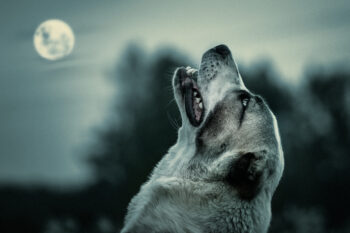Shutterstock
There’s something undeniably captivating about the image of a dog howling at the moon. Whether it’s a midnight serenade or a sudden burst of vocalization, this behavior often sparks thoughts of folklore and mystical powers. However, beyond these romanticized ideas, the truth is that dogs, like their wolf ancestors, communicate through vocalizations. The moonlight itself may not be the cause, but it can trigger behaviors tied to instincts, social interaction, or emotional expression. So, why do dogs howl at the moon? It’s not as mysterious as it seems!
The Influence of Ancestral Instincts
Shutterstock
Howling is a behavior that has been ingrained in dogs for thousands of years, passed down from their wild ancestors, wolves. In the wild, wolves rely on howling to communicate with their pack members, signal their location, and defend their territory. These vocalizations serve essential functions for survival, helping the pack stay coordinated over long distances and alerting others to dangers. Despite being domesticated, dogs have retained these instincts, and when they howl, it’s often an echo of those primal behaviors. Howling at the moon, particularly during nighttime, is a natural response for dogs, as they tap into these deep-rooted ancestral instincts when they are active and alert, just as their wolf ancestors were.
Emotional Expression Through Howling
Shutterstock
Dogs, much like humans, are capable of experiencing complex emotions, and howling is one of the ways they express these feelings. Howling can serve as an emotional release, whether a dog is feeling lonely, anxious, or simply wants attention. The moon, especially when it shines brightly in the night sky, can trigger certain emotional responses in dogs. The stillness of the night and the brightness of the moon can heighten a dog’s sensitivity to their surroundings, causing them to howl in response to feelings of isolation or distress. This behavior is often seen in dogs with separation anxiety, who may vocalize to seek comfort or alert their owners to their discomfort during the quieter, nighttime hours.
Social Behavior and Howling
Shutterstock
Dogs are highly social animals, and howling can also serve as a way for them to communicate with other dogs and humans. In the wild, wolves use howling to stay in touch with the rest of the pack, signaling their location or intentions. Domestic dogs retain this social instinct and often howl in response to hearing other dogs howling. It’s a way for them to join in and engage with their pack, even if they’re not physically present with other dogs. In some cases, dogs howl to get attention from their human family members, essentially saying, “Hey, I’m here!” It’s part of their natural need to connect and bond with those around them, making howling a form of social expression.
Territorial Instincts and Howling
Shutterstock
Dogs retain many of the territorial instincts of their wild ancestors, wolves, and howling is often a means of staking a claim on their space. In the wild, wolves howl to communicate boundaries and warn other packs of their presence. Domestic dogs exhibit similar behaviors, especially when they feel that their space or territory is being encroached upon. Even in a home setting, dogs may howl as a form of territorial defense or to assert dominance. The presence of the full moon, with its bright illumination, could trigger heightened vigilance, causing a dog to vocalize more in response to potential perceived threats. Howling in this context serves as an instinctive way for dogs to mark their space and remind others that they are present.
The Moon as a Catalyst, Not the Cause
Shutterstock
While the moon is often linked to the howling behavior of dogs, it is not the root cause of the behavior itself. Rather, the moon acts as a catalyst, creating environmental conditions that heighten the likelihood of howling. The full moon provides extra light, making the night brighter and more stimulating for dogs, who are naturally more active at night. This increased visibility can make dogs feel more energetic, leading to more vocalizations, including howling. The moon does not compel the dog to howl, but its presence triggers the conditions that bring out a dog’s instinct to communicate, whether out of excitement, territoriality, or emotional expression.
When Your Dog Turns Into A Nighttime Opera Singer
Shutterstock
So, the next time you hear your dog howling at the moon, don’t worry—they’re not summoning werewolves or performing a mystical ritual. It’s just your dog being true to their instincts, expressing emotions, or reacting to their surroundings. Dogs howl due to heightened activity, social needs, or territorial behaviors, and while it may seem like a midnight concert, it’s simply their way of connecting with the world around them. It’s just another quirky, endearing reminder of how deeply connected dogs are to their wild ancestry and the natural world.
The post The Real Reasons Dogs Sometimes Howl At The Moon appeared first on iHeartDogs.com.

